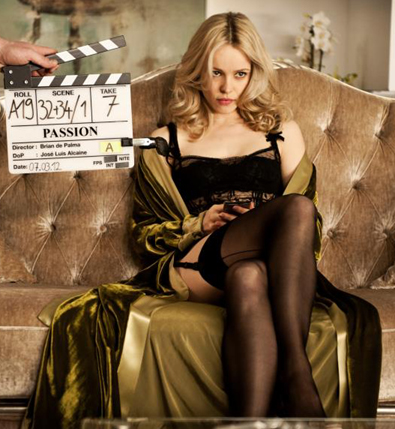"HYPNOTIC"... DE PALMA "ENGROSSES YOU WITH HIS ECSTATIC VISION"
 "He’s beyond any convention of classical narrative filmmaking," states Peter Labuza in his review of Brian De Palma's Passion, which he calls "hypnotic." Labuza states that this is De Palma doing what he does best, and that the director is "beyond any convention of classical narrative filmmaking (though one might have to ask when he ever was) and engrosses you with his ecstatic vision."
"He’s beyond any convention of classical narrative filmmaking," states Peter Labuza in his review of Brian De Palma's Passion, which he calls "hypnotic." Labuza states that this is De Palma doing what he does best, and that the director is "beyond any convention of classical narrative filmmaking (though one might have to ask when he ever was) and engrosses you with his ecstatic vision."According to Labuza, Passion parallels De Palma's Redacted from the start, "as Rachael McAdams and Noomi Rapace stare at a screen. They are master and servant in the world of corporate advertising, a sexual ferocity always willing to bubble over into soft-core pornography with every line of dialogue (plus a phallic bottle of liquor sitting right in front of them). Christine (McAdams) and Isabelle (Rapace) are working on a campaign for a smart phone, and during the middle of the night (as Christine indulges in some kinky mask and blindfold sex), Isabelle comes up with the idea for a campaign that involves an 'ass cam' joke in which her assistant Dani (Karoline Herfurth, a redhead with a fire both on the outside and inside) walks around in tight jeans and the camera exposes those who stare. It’s one of the great De Palma jokes in the film, but also the most essential: the camera exposes true desire and want, and as we laugh, we also realize that the image being presented only though cameras shows what men (and women) truly think.
"Such a relationship to the exposure of reality is essential, because so much of Passion is about the deception of real life performance. Christine and Isabelle duel and spar around promotions, boyfriends (both are cheating, but it seems also on each other), and their own disdain for each other ('it’s not backstabbing' is a repeated quip). De Palma never gives us the inner exposure of his two women, they play around with clothes and make up. Isabelle always dresses in pure black, and when Christine adds on red shoes and lipstick, it’s an intrusion onto the body. Meanwhile, Christine goes for the garish and big—Hitchcock reds and blues (a cross that could also double as a dagger dangling from her neck and three watches hanging on her wrist), and in one scene, she sits on her couch garmented in a golden satin robe and black lingerie, spread out like a queen, or at least demanding to be one.
"As Passion proceeds the frames become more expressive and more subjective, switching at one point to almost five minutes straight of subjective point of view shots. But again, what can we trust in the world of performance? De Palma flurries his camera through the action—push ins, zooms, and in the film’s central piece, a brilliant split screen use that only reveals its true revelations at the end as it plays with again our vision of watching. And while he leads us down one road—the cinematic frames suggest one answer, the truth once again lies in the recorded image. Like The Black Dahlia, the most real thing on screen is that which we see though screens."



